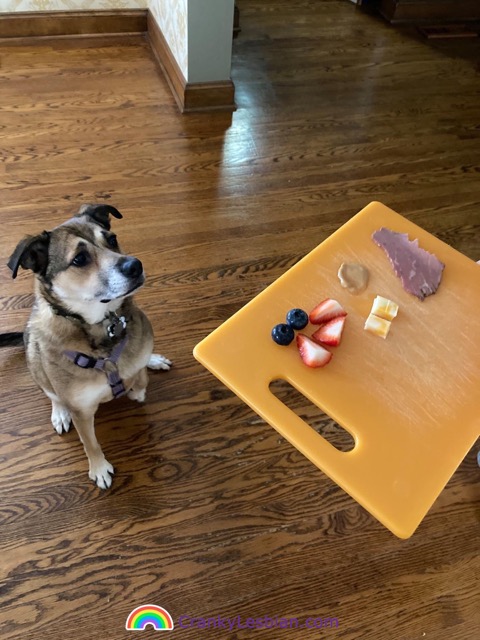
“What’s going on down there?” Crankenstein called downstairs from our bedroom one night a couple weeks ago, her tone suggesting more confusion than annoyance.
“I’m serenading Muriel as I unload the dishwasher,” I replied of the off-the-cuff (and probably equally off-key) Nat King Cole medley in which I faithfully substituted ‘woo,’ one of Muriel’s favorite expressions, for ‘you.’
“Muriel is the love of your life,” Crankenstein often says, referring to our dog, and while I don’t think that’s exactly correct, it’s true enough in spirit. A day or two after my kitchen sink concert, we again found ourselves discussing the songs we sing to her. Crankenstein’s signature tune is “The Final Pee-Pee,” a dramatic reworking of “The Final Countdown” that excites Muriel nightly not long before her bedtime, while I croon to her from the Great American Songbook.
Sheepishly, I admitted there’s a more modern classic that reminds me so strongly of Muriel that sometimes I can’t sing it to her without getting choked up: Alison Krauss & Union Station’s ethereal cover of “When You Say Nothing at All.” When Crankenstein shockingly replied she was unfamiliar with it, I opened my tablet, selected Now That I’ve Found You: A Collection from my library, and hit ‘play’ on the album version I first fell in love with decades before meeting Muriel — or my wife.
One could persuasively argue that folksy sentiments like “Try as I may I could never explain/What I hear when you don’t say a thing” and “Old Mr. Webster could never define/What’s being said between your heart and mine” perfectly describe our relationships with pets (or babies), but Crankenstein looked first affronted, then amused as she listened. “Of course a touching love song reminds you of Muriel,” she joked, glancing in the direction of the canine in question, whose foot was lodged in her ear.
We agreed that Muriel’s a creature of few words, preferring to communicate with grunts, groans, barks, growls and the arch of her ears and tail. “Sometimes I look at her and think ‘That dog’s never said a damn word to us,'” Crankenstein volunteered as she read this. “Yet she seems to say so much.” The simplicity of my relationship with Muriel is why I value it above most others. We don’t have to talk to share our feelings, we just know, and quiet moments spent in her presence are among the most peaceful I’ve ever enjoyed.
If there’s anyone in the universe other than Crankenstein who knows every inch of my heart, it’s the dog I slept beside on the floor for 16 months as she slowly recovered from her first terrible bouts of lumbosacral disease. When Muriel woke up in pain or couldn’t lower herself back onto her bed after a steroid-induced pee break at 3 am, she wanted to be held and comforted. “You’re crazy,” I was often told of those sleeping arrangements*, but Muriel had a haunted, bewildered look in her eyes every time she hurt and I couldn’t bear the thought of her being alone and afraid.
If our roles were reversed, I knew Muriel would’ve done the same for me. And recently she has, cheering me as all this Parkinson’s business has felt overwhelmingly dreary. Every time she demands to go outside or play tug of war over a slobbery stuffed fox, a bit of my worry about the future dissipates. For someone so conspicuously silent, she always knows just what to say.
*I wasn’t on the floor next to her all night; I’d retire to bed with Crankenstein and join Muriel a few hours later, summoned by her whimpers.